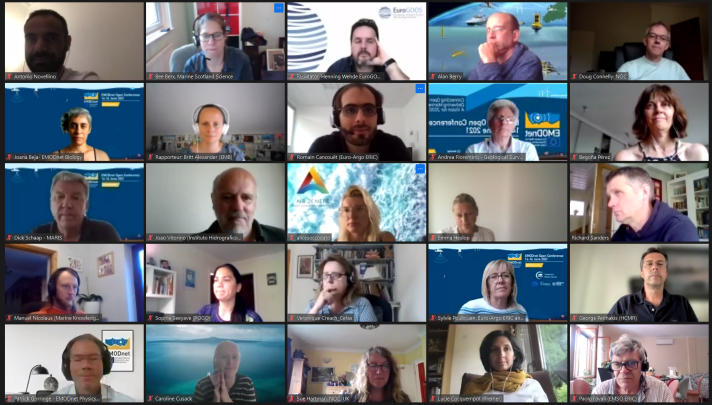EC Ocean Observation Community Recommendations on Ocean Technology and Ocean Observing Gaps and Requirements
On 18 June, the EC Ocean Observation event took place from 13:30 to 17:00 CEST. This event was organised by the EC Directorate-General for Maritime Affairs and Fisheries Maritime Innovation, Marine Knowledge and Investment, and co-organised by the EMODnet Secretariat, European Marine Board Secretariat, EuroGOOS and Copernicus Marine Service, in collaboration with the wider community.
It consisted of two sessions. The first session aimed at identifying how to accelerate deployment of more efficient and effective ocean observation technology, and the second session looked into gaps and requirements in ocean observation.
It brought together over 90 invited Ocean Observing and Marine Technology experts, including representatives from the research community (e.g., EU projects, national institutes and networks), marine/maritime industry, policy (e.g., national authorities, Regional Sea Conventions and European policy makers), European organisations and networks (e.g., EMODnet, Copernicus Marine Service, EuroGOOS, EMB, Marine Research Infrastructures) and International initiatives (e.g. NOAA, OECD, GOOS), and more.
A full event report is now available Full event report, together with a summary of Community Recommendations Community Recommendations.
Visual graphics were produced of both sessions, and are publically viewable, in the EMODnet Open Conference 2021 Virtual Exhibition, together with more community resources on European Ocean Observation and wider European efforts on marine data, information and knowledge.
For more information about the event, contact: secretariat emodnet [dot] eu (secretariat[at]emodnet[dot]eu)
emodnet [dot] eu (secretariat[at]emodnet[dot]eu)
Agenda: Ocean Observation Agenda
|
13:30 -13:40 |
Introduction, key scope, expected outputs, etc. (EC, DG MARE) |
|
Andreea Strachinescu, EC DG MARE Zoi Konstantinou, EC DG MARE (Meeting Chair) Kate Larkin, EMODnet Secretariat (Co-Chair) |
|
|
SESSION 1: OCEAN OBSERVING TECHNOLOGY: OPTIMISING EUROPEAN CAPABILITY |
|
|
13:40-14:20 |
Short showcase talks 5’ (5 slides / speaker) |
Presentation Sander van den Burg
|
|
|
14:20‑ 15:00 |
Breakout discussion: 4 break-out groups all discussing the same 3 topics, 40’ Facilitators: Christos Arvanitidis (LifeWatch ERIC), Sheila Heymans (EMB), Henning Wehde (EuroGOOS), Juanjo Dañobeitia (EMSO ERIC). Rapporteurs: Ana Lara-Lopez (EuroGOOS), Nicolas Pade (EMBRC ERIC), Ángel Muñiz Piniella (EMB), Kate Larkin and Nathalie Tonné (EMODnet). |
|
|
|
15:00-15:10 |
Virtual Coffee Break |
|
15:10-15:30 |
Report to plenary on Session 1: key recommendations from 4 break-out discussions |
|
SESSION 2: OCEAN OBSERVING GAPS AND REQUIREMENTS |
|
|
15:30-16:00 |
Short introduction to session: EC DG MARE / EMODnet Secretariat Short showcase talks (5’ max each) by key methodologies for Ocean observing gaps and requirements in Europe
Presentation Pierre-Yves Le Traon
|
|
16:00-16:50 16:50-17:00 |
Plenary Panel: Evolving ocean observing gaps and requirement setting Structured discussion, in plenary, with audience Q&A Panel Chair: Nadia Pinardi, UNIBO / EMODnet Mediterranean Sea-basin Checkpoint Coordinator Panelists - Inga Lips, EuroGOOS / EOOS Operations Committee - Enrique Alvarez Fanjul, Puertos del Estado / EuroGOOS - Quillon Harpham, HR Wallingford / EC Marine Knowledge expert group / EMODnet North Sea-basin Checkpoint Coordinator / EMODnet Associated Partner - Pierre-Yves Le Traon, CMEMS / MOi - Henrik Steen Andersen, EEA - Anita Franco, Estuarine & Marine Ecological Consultant Conclusions and close of meeting |

